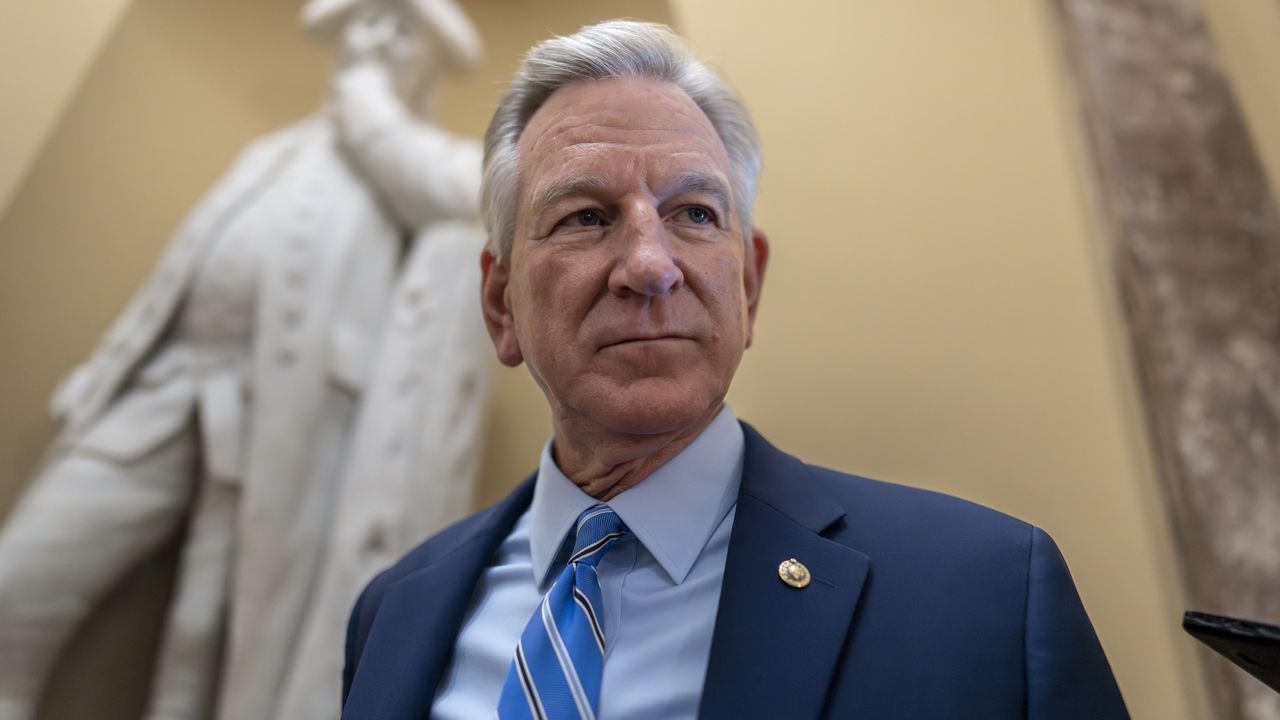Sen. Tommy Tuberville, R-Ala., said in an interview with Bloomberg Television’s “Balance of Power” on Tuesday that the military “is not an equal opportunity employer” in response to a question about why he did not support the next chairman of the Joint Chiefs of Staff.
The military is an equal opportunity employer — meaning discrimination based on race, color, national origin, religion, sex (including pregnancy), gender identity, or sexual orientation is explicitly banned — according to a Pentagon directive that has been in place since 1995 and continuously updated through the administrations of five presidents.
What You Need To Know
- Sen. Tommy Tuberville, R-Ala., said in an interview with Bloomberg on Tuesday that the military “is not an equal opportunity employer” in response to a question about why he did not support the next chairman of the Joint Chiefs of Staff
- The military is an equal opportunity employer — meaning discrimination based on race, color, national origin, religion, sex (including pregnancy), gender identity, or sexual orientation is explicitly banned
- Tuberville has previously criticized Gen. Charles “C.Q.” Brown Jr., who will become the nation’s highest ranking military officer on Sunday, for expressing a desire to have more diversity among Air Force pilots
- Tuberville has been at odds with the military for most of the year, blocking hundreds of officer promotions — including for Brown and the highest ranking positions in the Army, Marines and Navy — over his anger at the Pentagon’s abortion policy
Tuberville, a freshman Alabama senator who has held up military promotions for months in protest of the Pentagon's abortion policy, explained why he voted against Gen. Charles “C.Q.” Brown Jr. to serve as the next chairman of the Joint Chiefs of Staff.
"I like CQ," Tuberville insisted in the Bloomberg interview. "I've had him in my office several times back when he was chief of the Air Force. "He's a good person. He believes in what he's doing. We all have, you have to believe in what you're doing."
“I heard some things that he talked about about race and things that he wanted to mix into the military. Let me tell you something: our military is not an equal opportunity employer,” Tuberville continued. “We're not looking for different groups, social justice groups. We don't want to single-handedly destroy our military from within.”
When asked what it is about race that bothered Tuberville, the Alabama lawmaker referenced Brown's comments that the military needs more groups to have an opportunity to be pilots.
"I want it to be on merit," he said. "I want our military to be the best. I want the best people, I don't care who they are, men, women, it doesn't make any difference. Catholics, Protestants ... I want everybody to believe in the one goal that we have in this country for our military is to protect the taxpayers, to protect United States of America. Don't give me this stuff about equal opportunity. Because that's not what this military is about. Talk about making the best, training the best and being the best of this world."
Tuberville has previously criticized Brown who will become the nation’s highest ranking military officer on Sunday, for expressing a desire to have more diversity among Air Force pilots. The Alabama Republican also defended white nationalists serving in the military earlier this year.
The Pentagon declined to comment.
Democrats were swift to denounce Tuberville, with Connecticut Sen. Chris Murphy accusing his Senate colleague of promoting “white supremacy.”
“The way Sen. Tuberville talks so openly about… white supremacy is just jaw dropping. I refuse to allow this to feel normal,” Murphy wrote on X, the social media platform formerly known as Twitter.
Rep. Ted Lieu, D-Calif., an Air Force veteran with a quarter century of service, responded to Tuberville’s remarks on X by linking to the Pentagon directive outlining the military’s equal opportunity program’s policies.
“Since GOP Senator Tuberville never served in the military, he doesn’t understand that the military is an equal opportunity employer. Our military does not discriminate based on race,’ Lieu wrote, later adding “the military sets standards that everyone has to meet. But it doesn’t set standards based on race.”
Tuberville appeared to equate military initiatives to promote diversity and ensure racial minorities are given the same opportunity to serve in equal capacities to their white counterparts with a racial “quota” system.
“We have some great military people, but there's some in there that have a different agenda to make sure that they get their quotas in and we're not a quota,” Tuberville said. “I want the best people I don't care who they are, men, women. It doesn't make any difference. Catholics, Protestants, I want everybody to believe in the one goal that we have in this country for our military is to protect the taxpayers, to protect the United States of America.”
“Don't give me this stuff about equal opportunity, because that's not what this military is about,” Tuberville added.
Tuberville, a former college football coach who was elected to the Senate in 2020, has been at odds with the military for most of the year, blocking hundreds of officer promotions — including for Brown and the highest ranking positions in the Army, Marines and Navy — over his anger at the Pentagon’s abortion policy. He wants the military to stop paying for service members’ travel to receive reproductive health care when they need to travel from the state they are stationed in to another because of restrictive abortion laws passed in the wake of Roe v. Wade being overturned last year.
In a highly unusual circumstance, top military officials have publicly criticized Tuberville for his blockade, saying he is hurting military readiness and putting U.S. national security at risk because of the monthslong obstruction.
Last week, the Senate temporarily broke Tuberville’s holds on the nominations of Brown, the next Army Chief of Staff and the next commandant of the Marine Corps by bringing them to a vote and passing them with overwhelming, bipartisan majorities. Roughly 300 nominations remain outstanding, according to the Pentagon. Tuberville voted against Brown, the first African-American man to serve as Chairman of the Joint Chiefs of Staff.








